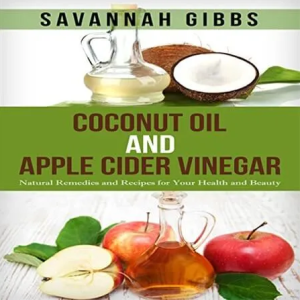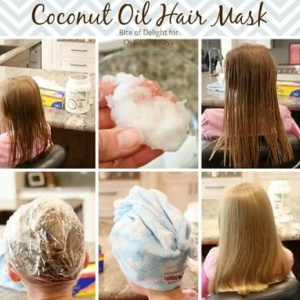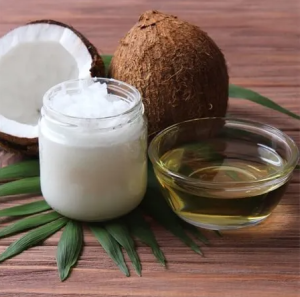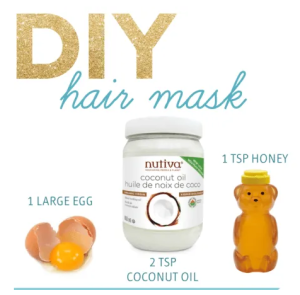Coconut oil has become well known for its many benefits, including helping repair everyday damage, improving texture, and restore health and shine to your hair better, and more. one of the best ways to nourish your hair with coconut oil is by using a hair mask. Here’s a look at the benefits of using a coconut oil hair mask and some tips about how to do a coconut oil hair mask.
What Are the Benefits of Coconut Oil for Hair?
1. Reduce protein loss
As we all know, hair is a protein and consists of three layers. While coloring, blow-drying, styling, and other treatments can cause your hair to lose some of the protein. Lauric acid, a type of saturated fat abundant in coconut oil, may benefit your hair by protecting against protein loss. Therefore, coconut oil reduced protein loss when used as a pre-wash and post-wash grooming product.
2. Smooth hair and reduces frizz
Coconut oil smooths the cuticle and reduces damage because it acts as a barrier of protection from physical friction, harsh chemicals, and UV rays.
3. Keep curly hair moisturized
Coconut oil can moisturize curly hair by conditioning inside and outside the curl, giving a smooth strand for less frizz and flyawaysCoconut oil is especially great for curly hair, which is more prone to dryness. Once moisturized, curl hair will have a soft definition with great shape and style memory.
4. Sooth dandruff
Lauric acid can provide microbial balance properties that help soothe a dry, flaky scalp and rebalance the scalp’s microbiome. It boosts good bacteria, plus it’s anti-inflammatory and moisturizing. Thus, coconut oil does help with dandruff, dry scalp, and eczema.
5. Strengthen hair and minimizes breakage
The nutrient-rich oil strengthens strands, in turn preventing breakage and helping hair look fuller.
How To Do A Coconut Oil Hair Mask For Hair
According to professionals, a 30-minute coconut oil mask can do wonders to restore hair moisture, while an overnight one can protect it for weeks on end. More importantly, creating a homemade coconut oil hair mask is pretty budget-friendly, especially since the majority of the ingredients can be found in most grocery aisles. Now keep reading to learn how to DIY a coconut oil hair mask.
For Dry Hair
A no-frills coconut oil hair mask will infuse dry, brittle hair with moisture. To make a simple coconut oil hair mask for dry hair, you’ll need:
2 tablespoons of extra-virgin coconut oil;
1 tablespoon of honey;
1 egg;
Step 1 Warm The Oil
If the coconut oil is not already in a liquid state, put two teaspoons of the oil into a bowl and place it into a container partially filled with hot tap water until the coconut oil will become liquid in a few minutes. If possible, Avoid microwaving the oil to prevent it from becoming dangerously hot.
Step 2 Mix Egg With Coconut Oil
Then whisk the egg in a separate bowl, then combine the egg with the heated (but not too hot!) coconut oil.
Step 3 Add Honey To The Mixture
Add the honey and whisk again until the mixture is consistent.
For Dull Hair
Coconut oil is a shortcut to moisture, while apple cider vinegar is great for deep cleansing. For this double-benefit hair mask, you’ll need:
2 tablespoons of extra-virgin coconut oil;
1 tablespoon of apple cider vinegar;

Step 1 Warm The Oil
If the coconut oil is not already in a liquid state, put two teaspoons of the oil into a bowl and place it into a container partially filled with hot tap water until the coconut oil is melted. If possible, Avoid microwaving the oil to prevent it from becoming dangerously hot.
Step 2 Mix Apple Cider Vinegar With Coconut Oil
Then combine the oil with the apple cider vinegar in a bowl and mix well.
For Damaged Hair
Coconut oil by itself overnight is good for extremely dry damaged hair. For deep conditioning damaged hair, all that’s needed are two tablespoons of coconut oil.
How To Use Coconut Oil Hair Mask For Hair
1. To start, use a spray bottle to wet your hair. Or, you can also apply the coconut oil hair mask in the shower.
2. Then, apply the warm coconut oil hair mask evenly over your damp hair. You can firstly part your hair to apply the coconut oil in a manageable section, which can help ensure that every hair is coated.
Notice: Apply more coconut oil to the driest sections of your hair, typically the ends, and less on the healthier parts of your hair, typically near the scalp.

3. Once you’ve coated all your hair, place a shower cap over your head.
4. Let the mask sit for 1 to 2 hours. Of course, you can leave the mask on their hair overnight for deeper conditioning.
5. Rinse out with lukewarm water, and shampoo and condition as normal.
Some Useful Tips About Using Coconut Oil Hair Mask For Hair
1. For best results, try to shop for the best coconut oil for hair – the unrefined variety (a.k.a., virgin or extra-virgin oil). After all, unrefined coconut oil comes from the first pressing of fresh raw coconuts, no chemicals added and has a distinct aroma of coconut
2. Use coconut oil at night instead of in the morning. That is because it takes time for hair to absorb coconut oil. If you use the oil in the morning, your hair can wind up looking and feeling greasy. Instead, it would be better to apply it at night, then shampoo in the morning.
3. In the process of applying a coconut oil hair mask to your hair, it is best to use hair clips to keep saturated strands away from your face and eyes.
4. Also, you can protect your clothes from the oil by placing a towel around your neck.

5. Apply coconut oil hair mask lightly. Even though it’s relatively light, coconut oil can weigh your hair down if you use too much. To avoid buildup, start with a small amount of coconut oil(no more than a teaspoon)and gently massage the oil through your hair, starting at the midsection and continuing to the ends.
If you have thick hair, you may be able to use a little more than that.
In a word, everyone’s hair is different, and the best way to use coconut oil can vary from person to person. You may have to adjust the timing and amount to avoid greasy hair or build-up on your scalp.
6. Use a small amount at first to see how your skin reacts. Although applying coconut oil directly to the scalp can alleviate dryness, others struggle with issues like irritation and clogged pores.
If you’ve never used coconut oil on your scalp, start with a minimal amount until you know how your skin reacts.
If you like the results and you don’t develop any problems, apply the oil about two to three times weekly.
7. When it comes time to remove coconut oil from your hair, keep in mind that you may need two or three rinses to entirely wash out the mask to eliminate slickness.
8. We recommend keeping your coconut oil hair mask on for at least 30 minutes for a quick moisture restoration. If you feel like your hair is damaged or in need of a more long-term repair, you can sleep with it overnight too.
Just make sure to sleep with a cap or bonnet to keep it in place and off of your pillow as you sleep. A plastic cap might work best so you can easily wash it off in the morning.
FAQs About Coconut Oil
1. Is it better to put coconut oil on dry or wet hair?
For easier absorption and styling, make sure to apply the oil to damp hair.
2. How long should I leave coconut oil in my hair?
If your hair is thin or gets greasy easily, you can skip the scalp and allow the coconut oil to sit on your hair for 20 to 30 minutes after application so the oil doesn’t weigh your hair down. If your hair is very dry or porous, you can leave it on longer. For example, you can leave it on overnight.
3. Is coconut oil good for hair growth after chemo?
There is a lack of evidence to suggest coconut oil is good for hair growth. Fortunately, in many cases, hair will grow back on its own after chemotherapy treatment is finished. This can take between four to six weeks after treatment, of course, the length of time will differ between people.
4. Can you use coconut oil for curly hair?
Yes, you can use coconut oil for curly hair. It can be beneficial for any type of hair, as well as damaged and undamaged hair. When it is used as both a prewash and post-wash, coconut oil is the only tree oil to lower the loss of proteins in hair, which can help with damaged hair repair and possibly helps prevent further damage.
5. Are there benefits to using coconut oil on skin every day?
There is no scientific evidence on the possible benefits of using coconut on the skin every day. As long as your skin does not have a bad reaction to the oil, applying it two or three times each week should do the trick. It is worth mentioning that coconut oil does not serve as a suitable replacement for sunscreen and is not effective in blocking UV rays.





